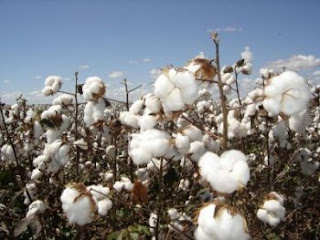A Guerra Que Não Interessa - The War That Does not interest
'Financial Times': retaliação pode provocar "guerra comercial" entre Brasil e EUA.
'Financial Times': retaliation can provoke " war comercial" between Brazil and U.S.A..
A decisão do Brasil de aumentar as tarifas de importação de produtos americanos, após uma autorização da Organização Mundial do Comércio (OMC), ameaça provocar uma guerra comercial entre os dois países, afirma nesta terça-feira o diário econômico britânico Financial Times.
O governo brasileiro anunciou na segunda-feira uma lista de 102 produtos americanos que deverão ter sua tarifa elevada, totalizando cerca de US$ 591 milhões em sobretaxas. A medida foi anunciada após uma decisão favorável da OMC ao Brasil sobre uma disputa em relação aos subsídios pagos pelo governo americano aos seus produtores de algodão.
A OMC autorizou o Brasil a impor até US$ 829 milhões em sobretaxas. A medida deve entrar em vigor no próximo mês, mas o governo americano espera conseguir um acordo nos próximos 30 dias para revertê-la.
Discussões
O Financial Times observa que a questão deverá ser objeto de discussões entre as autoridades brasileiras e o secretário de Comércio americano, Gary Locke, e o assessor adjunto de segurança nacional para assuntos econômicos, Michael Froman, que chegam ao Brasil nesta terça-feira.
"O Brasil deixou claro que está aberto a um acordo antes de as novas tarifas entrarem em vigor, mas as autoridades enfatizaram que qualquer acordo deverá ser aplicado especificamente ao algodão. Uma possibilidade pode envolver transferência de tecnologia dos Estados Unidos para os produtores de algodão brasileiros", diz o jornal.
Mas a reportagem observa que é incerta a margem de manobra do governo americano para negociações, já que alterações significativas no programa de subsídios ao algodão demandariam mudanças na legislação agrícola. "Conseguir a aprovação do Congresso poderia ser difícil", diz o jornal.
Reação
Em outro texto, o Financial Times comenta que "cada vez mais os parceiros comerciais dos Estados Unidos reagem à pressão". Apesar disso, o jornal observa que as economias dos Estados Unidos e do Brasil "são menos dependentes do comércio do que os investidores podem temer".
A reportagem cita um levantamento da Economist Intelligence Unit segundo o qual as exportações de bens e serviços do Brasil representam apenas 14% do PIB, em comparação com 40% no Chile e na China e 30% no México. A proporção das importações, mesmo tendo dobrado desde 1990, ainda é de apenas 13% do PIB. Do outro lado, para os Estados Unidos o Brasil representou apenas 2,5% de suas exportações de bens no ano passado.
The decision of Brazil to increase the tariffs of importation of American products, after an authorization of the World-wide Organization of Comércio (OMC), threat to provoke a commercial war between the two countries, affirms in this tuesday daily the economic Financial Times British. The Brazilian government announced in the monday a list of 102 American products that must have its raised tariff, totalizing about US$ 591 million in over-percentages. The measure was after announced a decision favorable of the OMC to Brazil on a dispute in relation to the paid subsidies for the American government to its producers of cotton. The OMC authorizeed Brazil to impose until US$ 829 million in over-percentages. The measure must enter in vigor in the next month, but the American government wait to obtain an agreement in next the 30 days to revert it. Quarrels Financial Times observes that the question will have to be object of quarrels between the Brazilian authorities and the secretary of American Commerce, Gary Locke, and the associate assessor of national security for economic subjects, Michael Froman, that arrive at Brazil in this tuesday. " Brazil left clearly that it is opened to an agreement before the new tariffs entering in vigor, but the authorities had emphasized that any agreement will have specifically to be applied the cotton. A possibility can involve technology transfer of the United States for the cotton producers brasileiros" , it says the periodical. But the news article observes that the edge of maneuver of the American government for negotiations is uncertain, since significant alterations in the program of subsidies to the cotton would demand changes in the agricultural legislation. " To obtain the approval of the Congress could be difícil" , it says the periodical. Reaction In another text, Financial Times comments that " each time more the commercial partners of the United States react to pressão". Although this, the periodical observes that the economies of the United States and Brazil " they are less dependents of the commerce of what the investors can temer". The news article cites a survey of the Economist Intelligence Unit according to which the exportations of goods and services of Brazil represents only 14% of the GIP, in comparison with 40% in Chile and China and 30% in Mexico. The ratio of the importations, exactly having folded since 1990, still is of only 13% of the GIP. Of the other side, for the United States Brazil represented only 2.5% of its exportations of good in the last year.



Comentários